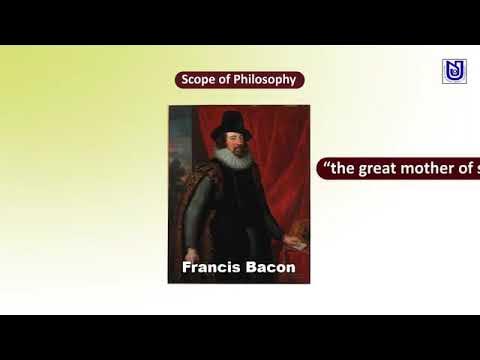Bertrand Russell - Mankind's Future & Philosophy
Summary
TLDRIn this insightful dialogue, Russell explores the essence of philosophy, distinguishing it from science by its speculative nature on matters beyond current exact knowledge. He articulates philosophy's dual purpose: to stimulate speculation in areas not yet accessible to scientific inquiry and to foster a humble recognition of our intellectual limits. Russell highlights philosophy's historical evolution, noting its shift from speculative hypotheses, like Democritus's atomic theory, to established scientific facts. He also discusses the diverse roles and perspectives of philosophers, advocating for philosophy's role in understanding the world rather than merely altering it. Through examples, Russell underscores the importance of philosophy in encouraging thoughtful action amidst uncertainty and fostering intellectual modesty.
Takeaways
- 🤔 Philosophy involves speculation about matters where exact knowledge is not yet possible.
- 📊 Science represents what we know, whereas philosophy covers what we don't know, highlighting a dynamic transition of concepts from philosophy to science as knowledge advances.
- 💭 Philosophy serves to keep alive speculation about things not yet amenable to scientific knowledge, expanding the imaginative purview of the world.
- 🔍 Philosophy also plays a critical role in revealing the limits of our knowledge, urging a modest awareness of the vast unknown.
- 💡 Historical examples, like the atomic hypothesis by Democritus, showcase philosophy's role in seeding ideas that later become scientific truths.
- 🌎 Philosophy and science are distinct but interconnected, with philosophy addressing questions beyond the scope of current scientific understanding, including values and ethics.
- 📖 Philosophical schools and trends vary by region and historical period, reflecting diverse focuses from understanding the world to moral and ethical considerations.
- 🌱 The role of philosophy in society includes both supporting and challenging the status quo, as exemplified by different philosophical figures and movements.
- 🔬 Bertrand Russell identifies himself with 'logical atomism', emphasizing the importance of analysis to reach foundational logical elements of understanding.
- 🚩 Modern philosophy, especially in English-speaking countries, has evolved towards linguistic analysis to clarify the meanings of questions rather than directly answering them.
- 📚 Philosophy's practical utility lies in enabling action with vigor in the face of uncertainty, encouraging a balance between doubt and decisiveness.
Q & A
What is Russell's definition of philosophy?
-Russell says philosophy consists of speculations about matters where exact knowledge is not yet possible.
What is the difference between philosophy and science according to Russell?
-Russell says science is what we know, while philosophy is what we don't know. As knowledge advances, things cease to be philosophy and become science.
What are the two main uses of philosophy according to Russell?
-Russell says the two main uses of philosophy are 1) to keep alive speculation about things not yet amenable to scientific knowledge, and 2) to show that there are things we thought we knew but actually do not know.
Why does Russell think Democritus was ahead of his time?
-Russell says Democritus invented the atomic theory, which turned out to be the right scientific view over 2000 years later. But in his day it was just a suggestion that could not be tested.
What does Russell see as the purpose of philosophy regarding changing versus understanding the world?
-Russell believes the purpose of philosophy should not be to change the world, but rather to understand it. This is the opposite view of Marx.
What does Russell mean by 'logical atomism' in defining his personal philosophy?
-By logical atomism, Russell means analyzing a subject matter down to things that cannot be analyzed further. These would be the logical building blocks out of which the thing is constructed.
What does Russell see as the main trend in English-speaking philosophy today?
-Russell observes a trend toward linguistic philosophy - focusing on getting the meanings of questions clear rather than actually answering them.
How does Russell suggest philosophy can help guide practical action?
-Russell believes philosophy can help people act vigorously even when uncertain, by instilling every belief with some doubt and avoiding false certainty.
Why does Russell think science diminishes the importance of philosophy?
-As science advances and provides more knowledge, Russell believes it inevitably reduces the scope and importance of speculative philosophy.
What does Russell see as philosophy's continuing value?
-Russell says philosophy retains value by addressing questions beyond science, and by promoting intellectual modesty about the limits of human knowledge.
Outlines

Dieser Bereich ist nur für Premium-Benutzer verfügbar. Bitte führen Sie ein Upgrade durch, um auf diesen Abschnitt zuzugreifen.
Upgrade durchführenMindmap

Dieser Bereich ist nur für Premium-Benutzer verfügbar. Bitte führen Sie ein Upgrade durch, um auf diesen Abschnitt zuzugreifen.
Upgrade durchführenKeywords

Dieser Bereich ist nur für Premium-Benutzer verfügbar. Bitte führen Sie ein Upgrade durch, um auf diesen Abschnitt zuzugreifen.
Upgrade durchführenHighlights

Dieser Bereich ist nur für Premium-Benutzer verfügbar. Bitte führen Sie ein Upgrade durch, um auf diesen Abschnitt zuzugreifen.
Upgrade durchführenTranscripts

Dieser Bereich ist nur für Premium-Benutzer verfügbar. Bitte führen Sie ein Upgrade durch, um auf diesen Abschnitt zuzugreifen.
Upgrade durchführenWeitere ähnliche Videos ansehen
5.0 / 5 (0 votes)






